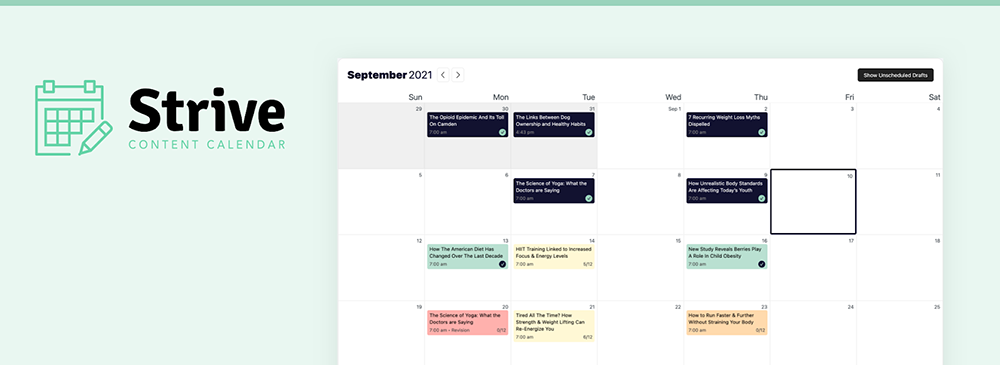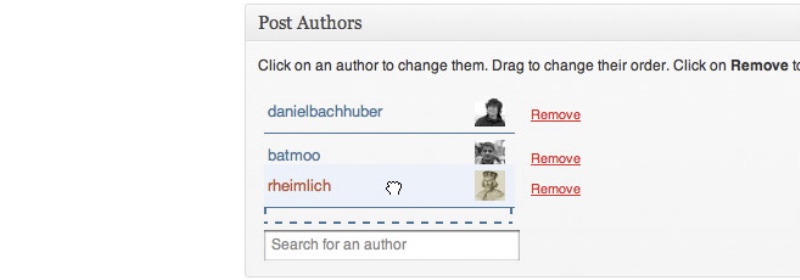10+ Best WordPress Multi-Author Management Plugins

Running a website is tough. There are only 24 hours in a day, and tasks can quickly stack up; writing your content, marketing it, promoting it via social media, and responding to any queries is exhausting, not to mention time-consuming.
Most successful people quickly realize that they can only do so much themselves, and a one-man business can only go so far. At some point, it makes sense for a business owner to delegate some responsibility: it allows workers to specialize, and to ensure all tasks get done on time. A large, highly-skilled team is better able to expand a website than one blogger working solo.
For bloggers, content is your business. The more top quality content you publish, the more popular you become, the more traffic you will attract, and the more quickly your business will grow. As your website begins to generate revenue, it makes sense for you to start hiring writers to produce content on your behalf – it’s no surprise that the majority of larger websites have multiple authors contributing, including here at WP Explorer.
However, while the benefits of working with writers is clear, it’s not without problems. You will have additional communication and collaboration problems, you need a solution for reviewing and editing your author’s work to ensure quality is consistently high, and you need to make sure your authors get the credit they deserve for each piece.
To solve these problems, a number of WordPress plugins have been developed to help you effectively manage your multi-author blog. Today, we are going to look at 10+ of the best WordPress multi-author management plugins you can use to make managing authors a whole lot easier.
1. Strive Content Calendar

When juggling multiple authors it’s important to keep your content on track. Once great way to do that is with an editorial calendar like Strive. This helpful WordPress plugin adds features to organize your publishing schedule and keep track of your authors.
While you can certainly manually manage your blog, Strive just makes things easier. Use the plugin’s content calendar to plan out your schedule. Adding new or current post drafts is as simple as clicking the plus icon on a day of the week. Then you can use the Pipeline with color coded post statuses to keep track of each post. You can add general topics as “Not Started” and allow authors to claim them and move them into “Writing” as they work. Then you (or your editor) can jump on at the “Editing” stage. You can also add a checklist to your post editor so author’s don’t forget important steps, like spell check or adding a featured snippet for search results. And there’s also a revision feature built-in so your team can create and schedule post updates as time goes on to keep your content evergreen.
2. User Role Editor Free WordPress Plugin

WordPress allows you to assign five different ‘roles’ to users, including Administrator, Editor, and Author. Each role comes with its own set of actions that users in that group can perform – otherwise known as permissions. An administrator can do anything they like, but Authors face more restrictions – for example, you don’t want a rogue author publishing content an admin hasn’t approved, or having access to your theme settings. Most user restrictions are logical, but sometimes you will want to give permission for a user group to perform a specific action that WordPress, by default, doesn’t allow.
The User Role Editor plugin gives you complete control over which actions each user group can perform. There is a list of core capabilities for you to choose from – such as uploading media, adding plugins, and publishing posts – and you can set your own custom actions, too. The plugin also allows you to add custom user roles, as the default five user roles might be insufficient to fully segregate your users.
3. Co-Author Plus

By default, WordPress allows you to credit just one author for each post – and that means only one author bio box. With today’s audience preference for long-form content, it is not uncommon for two, or even three, authors to work on any one article in collaboration. The Co-Author Plus plugin allows you to give the due credit to all your hardworking authors by allowing you to insert multiple by-lines below a specific article. Co-Authors can then edit any of their articles.
Co-Author Plus is a useful plugin for anyone looking to accept one-off guest posts from contributors, too. WordPress requires a user to have their own user account to be credited for writing an article. Too much effort for an author contributing just one post. However, Co-Author Plus allows you to add by-lines to authors without a WordPress account on your site. All you have to do is create a guest profile and you’re good to go. The plugin lets you change the order of the author by simply dragging and dropping their name. And it comes with a search functionality to make it easier for you to search authors from your author list.
4. PublishPress Revisions

Users usually don’t have permissions to edit a published post when working on a multi-author blog. However, PublishPress Revisions enables you to integrate a system that automatically gives permission to all the users to suggest changes in their already published post. Of course, no changes will be made without the approval of the administrator. The plugin works by adding a new WordPress role, “Revisor”, and works with blog-wide WordPress Roles. Pending Revisions allow designated users to propose modifications to a currently published page or post.
5. Editorial Calendar

Editorial Calendar is the most advanced and feature-rich plugin that is used by a wide range of websites. The plugin allows you to add a beautiful look at the upcoming posts. Editorial Calendar also enables you to create drafts as well as a schedule a time right from the calendar itself. You can then use those drafts on a daily basis or modify the time. With the plugin you can see all of your posts and when they’ll be posted, manage drafts with the drafts drawer, and quick edit post titles, contents, and times.
6. Edit Flo

Edit Flow is a fantastic plugin for managing your editorial workflow. It is particularly useful if you have a workforce consisting of more than just authors — for example, if you also work with an editor. The plugin includes a visual calendar for scheduling your posts, but also allows you to attach a number of custom statuses to an article. This makes it simple for your workforce to collaborate: for example, after a first draft, an author could switch the articles status to ‘Needs Editing’ so that an editor can quickly pick up the job.
In addition, the Edit Flow plugin also facilitates improved communication between your team. Below the text editor, editors and authors can leave private comments for each other. Relevant users will also be notified of a status change or comment on one of their articles.
7. Author Avatars List
![]()
If you want to attract the very best authors to work on your website, you will need to give them the appropriate credit for their efforts. One way to do this is to include an author avatar list in your sidebar — this is also handy for visitors, who can quickly find posts by their favorite authors.
The Author Avatar List is a great plugin for this very purpose. You can add an avatar list to a sidebar using a dedicated widget, or you can use a simple shortcode to add it anywhere within a specific post or page. It gives you complete control over how your author’s avatars are displayed, by allowing you to select from a number of customization options. For a start, you can select the title of the area (only when you use the widget), choose the number of author avatars to display, and the size of the thumbnail image. You also have the option to display a short author bio alongside the avatar, as well as selecting the way the avatars are ordered — you can go with a random order, too. When a visitor clicks on one of your author’s images, they will be taken straight to the articles written by that person.
8. Post Pay Counter

Post Pay Counter is similar to Ad Sharing, which allows you to configure payment calculations on the basis of admin-defined fields such as comments, images, visits, the number of words, and the number of posts.
The plugin allows you to pay per post, visit, word, comment, and image. Or you can setup payments with an incremental system. And Post Pay Counter includes built-in customizable permissions to prevent users from using functions and seeing stats that they are not supposed to see.
9. Users Submitted Posts

Users Submitted Posts is considered to be #1 plugin for user-generated content. The plugin allows you to add a frontend form via shortcode or template tag that lets you users upload images and submit posts. You can add the shortcode [user-submitted-posts] to any widget, page or post.
Post submissions can allow for post content, URL, author, category, tags, title, featured image etc. The submission form includes options for hidden fields, WP’s built-in rich text editor for post content, customizable captcha and input validation to stop spam.
10. WP User Frontend

Want to limit the access of your authors to the backend of the website? WP User Frontend can make it possible for users to add their posts directly from the frontend of the website. The plugin also allows your users to create, update, edit and delete posts right from the frontend.
With the plugin installed a user can create a new post, upload attachments, edit posts, edit profiles, and more from the frontend. And administrators can manage users from the frontend, as well as limit any user level on accessing the backend of the website.
11. PublishPress Capabilities

PublishPress Capabilities is a modest, robust and powerful WordPress plugin that enables you to change the inbuilt capability of a user role in the WordPress powered website. It offers the simplest way to manage WordPress user role definitions such as author, editor, contributor, subscriber etc.
With PublishPress Capabilities you can create and manage user roles, backup and restore Roles and Capabilities to revert your last changes (or to WordPress defaults) and limit capabilities by role. The plugin also enables you to copy any role all network sites and mark any role for auto-copy to future network sites.
So now as you have gone through the list of best multi-author management plugin, you can choose the most suitable ones for your website. Of course, there are many more plugins out there to choose from, but the plugins featured today are solutions for different, and unique, problems you may face.
By installing these plugins, you can overcome most of the problems associated with running a multi-author blog. By effectively managing your workforce, you are able to make use of the additional manpower at your disposal. Which, in turn, will allow your blog to grow at a much quicker rate.
Can you recommend any more plugins for multi-author blog owners? Let us know in the comment section below!



